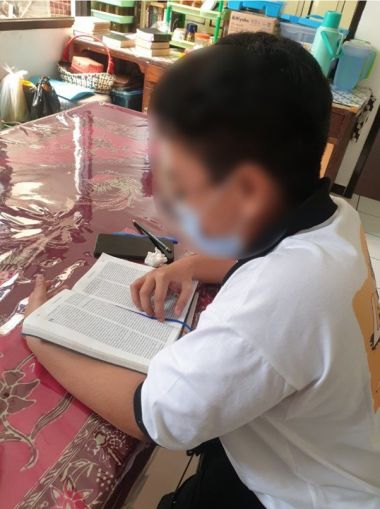Indonesia: drawn to Jesus by a familiar song

There was something about the song that struck a deep chord. "Not with gold and silver, You redeemed me with Your love and sacrifice."
It was a worship song, "As You Want."
"The song sounded so familiar to me," recalls Tari* from western Indonesia. At the time she was in her first year at high school. She had been raised a Muslim in a strongly Islamic nation. This type of worship song was not something she heard every day.
"Then I remember when I was a small kid, this song was performed during a TV show."
She says she felt strangely peaceful listening to the song. She began to seek out more songs like it.
Tari became more and more curious about the peace she was experiencing each time she heard these worship songs. Her curiosity grew: she went online and looked up "Who is Isa al-Masih (the name given to Jesus in the Koran) in Christianity?"
At the same time, she continued to ask God for direction on the ultimate right path while she faithfully carried out her religious duties as a Muslim.
Then one night, Tari had a dream. She found herself on a very long, almost endless road. She did not understand the meaning of the dream. But a few weeks later, the dream returned. However, this time, that long road ended in a dazzling light, and she distinctly heard the words "I am the way, the truth, and the life."
She had no idea what that meant.
"I couldn't get those words out of my head. Finally, I tried searching for it on Google and discovered that it alludes to John 14:6 in the Bible. I came to the realization that Isa Al-Masih (Jesus) is the way and the truth and the life. I get goosebumps as I remember that moment", she says, pointing to her arm.
The chance to learn what this meant came when Tari was living away from her home. Her uncle, who is a Christian, started taking her to church. And after a long time, she made the decision to follow Jesus.
"I was so happy that I finally became a believer," Tari exclaimed, "I was overjoyed; I purchased a cross necklace."
God provided her with a mentor, who helped her grow in her faith through discipleship.
"And when my mentor asked if I want to be baptized, I answered yes right away. Whatever happens later, let it be."
Soon after her baptism, Tari made the decision to return home. She didn't intend to tell anyone of her newfound faith but that quickly slipped after her friends saw her cross necklace around her neck.
"Wow! Are you an infidel now?" they enquired, "Why do you wear a cross necklace?"
Before Tari could explain herself, she says, "They pulled the necklace off my neck and threw it away. I was in pain, but I was not mad at them. I wanted to show them the love of Jesus."
It clearly worked, as one of the girls also came to faith in Jesus later on.
Fearing far worse consequences, Tari did not have the courage to tell her parents of her decision to follow Jesus. She hid her baptism certificate in her wardrobe, and behaved as if nothing had changed.
And then, the thing she feared the most happened. While she was out of town, her mother found her baptism certificate. She called Tari immediately.
Her mother was hysterical, asking lots of questions. She could not accept that Tari had become a Christian. Tari was scared and sad at the same time, feeling that she had somehow let down her mother. However, there was no turning back.
In the end, she decided that she was not ready for what she would face back at home. Tari asked to stay in the house of her mentor, which is outside of her hometown, where she currently remains.
Local partners of the charity Open Doors are keeping in contact with Tari and supporting her through prayer and encouragement.
Tari hopes that one day she will be able to face her mother and her family again. However, she says she is not ready to do that yet.
*Name changed for security reasons
Open Doors is a global NGO network which has supported and strengthened persecuted Christians for over 60 years and works in over 60 countries. Open Doors provides practical support to persecuted Christians such as food, medicines, trauma care, legal assistance, safe houses and schools, as well as spiritual support through Christian literature, training and resources.











